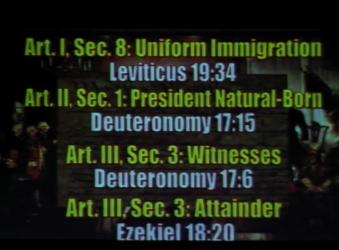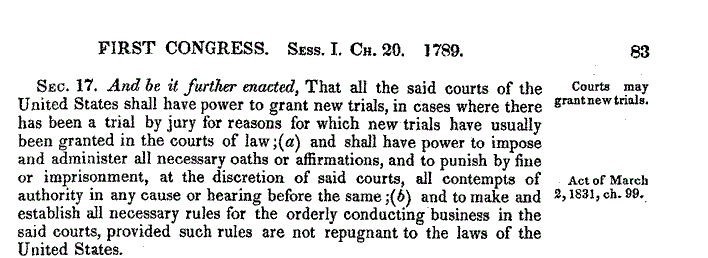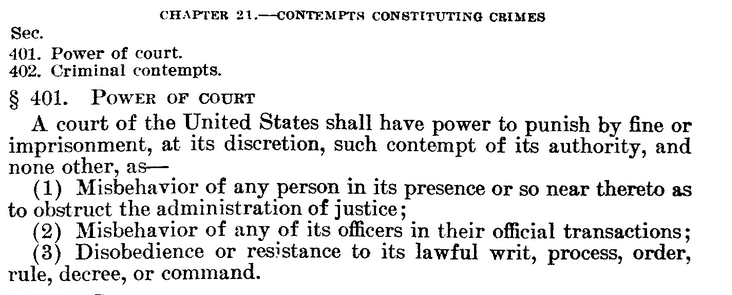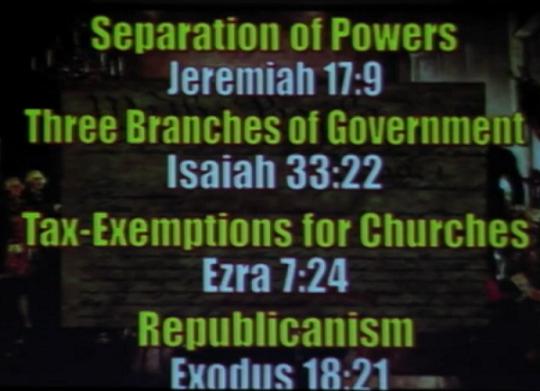According to Politico, Ben Carson’s business manager Armstrong Williams told CNN’s Alisyn Camerota this morning that Carson’s rejection of the possibility of a Muslim president was “not an issue of religion, it is an issue of one’s belief system, of how they will govern.”
Someone needs to tell Carson that religions and beliefs systems have a lot in common. Whatever one calls one’s belief system, the Constitution forbids a religious test. Carson is making this unnecessarily difficult.
Carson said there are tenets of Islam which sanction the killing of gays and Jews. Does he not realize what Leviticus says? Is he unaware that some Christian movements have advocated hatred toward Jews?
Carson and his handlers are stereotyping Muslims and displaying group-serving bias regarding Christianity. One knows the diversity of a social group to which one belongs much better than to an out group. Carson has lumped all Muslims into his stereotyped view of Islam while ignoring similar elements within his own religion.
Tag: constitution
Ben Carson's Muslim President Comments and the 1788 Debate in North Carolina Over Ratification of the Constitution
So Ben Carson said he wouldn’t support a Muslim for President and Islam is inconsistent with the Constitution. Watch:
Then he said he might vote for a Muslim for Congress.
This was such an easy question that I am surprised Carson botched it up. Even if you personally would not vote for a Muslim, the Constitution prohibits a religious test so it doesn’t matter what Ben Carson’s opinion is. All I can figure is he wanted to bounce with anti-Muslim sentiment.
The issue of a Muslim (Mahometan) president came up during the North Carolina Debates over ratification of the Constitution in 1788 (to read it all keep clicking the next image). The defenders of the Constitution indicated that religious liberty would not prevent a Muslim from running. Being elected however, is another matter, and according to one delegate would require a major change in public sentiment.
Speaker James Iredell, appointed to the Supreme Court by George Washington in 1790, answered worries that a pagan or Mahometan might gain office:
But it is objected that the people of America may, perhaps, choose representatives who have no religion at all, and that pagans and Mahometans may be admitted into offices. But how is it possible to exclude any set of men, without taking away that principle of religious freedom which we ourselves so warmly contend for? This is the foundation on which persecution has been raised in every part of the world. The people in power were always right, and every body else wrong. If you admit the least difference, the door to persecution is opened. Nor would it answer the purpose, for the worst part of the excluded sects would comply with the test, and the best men only be kept out of our counsels. But it is never to be supposed that the people of America will trust their dearest rights to persons who have no religion at all, or a religion materially different from their own. It would be happy for mankind if religion was permitted to take its own course, and maintain itself by the excellence of its own doctrines. The divine Author of our religion never wished for its support by worldly authority. Has he not said that the gates of hell shall not prevail against it? It made much greater progress for itself, than when supported by the greatest authority upon earth.
He added later:
It is apprehended that Jews, Mahometans, pagans, &c., may be elected to high offices under the government of the United States. Those who are Mahometans, or any others who are not professors of the Christian religion, can never be elected to the office of President, or other high office, but in one of two cases. First, if the people of America lay aside the Christian religion altogether, it may happen. Should this unfortunately take place, the people will choose such men as think as they do themselves. Another case is, if any persons of such descriptions should, notwithstanding their religion, acquire the confidence and esteem of the people of America by their good conduct and practice of virtue, they may be chosen. I leave it to gentlemen’s candor to judge what probability there is of the people’s choosing men of different sentiments from themselves.
Iredell saw that the Constitution does not require Christianity to be the national religion. A president of a non-majority religion might be elected if voters become less Christian or because an individual of a minority religion displays trustworthy character.
In any case, Iredell made it clear that Christianity ought not depend on the support of Constitution or any other worldly authority.
Carson’s later came out and said he didn’t oppose a Muslim running for office if the candidate rejected Sharia law.
The next question to ask Carson is if the Constitution is flawed since it forbids a religious test.
David Barton’s Biblical Constitution – Happy Constitution Day!
Happy Constitution Day!
In recognition of the day, I am reprinting a popular post (July 2013) debunking David Barton’s contention that the Constitution quotes the Bible.
In recent days, Barton asserted that the founders believed God’s law was higher than the Constitution. The quote from theologian Timothy Dwight provides a powerful counter to Barton’s claim.
David Barton’s Biblical Constitution
In his speeches to churches, David Barton asserts that there are Bible verses throughout the Constitution. On past occasions, he has said that the Constitution quotes the Bible verbatim. In his recent appearance before Crossroads Church in Oklahoma City, OK, Barton said people today don’t recognize these verses in the Constitution because they are ignorant about the Bible. He begins his discussion of the Bible and the Constitution at about 12 minutes into the following sermon:
Barton said:
It’s significant that if you know the Bible and if you read the Constitution, you see Bible verses throughout the Constitution. You see Bible verse after Bible verse that is noted in the Constitution. Now today, we have a lot of people who say, no, no, the Constitution is a secular arena, the Constitution is a secular document. When somebody tells me the Constitution’s a godless document, that simply tells me, they wouldn’t know a Bible verse if they saw one; if it bit them on the ankle they wouldn’t know what a Bible verse was. See what happened is the Constitution is filled with Bible verses, Bible references, Bible phrases, and Bible terminology cause back then, they didn’t see any reason to tell you it came out of the Bible because back then everybody knew that. They didn’t put it, but we’re so biblically illiterate today, we don’t recognize that.
Timothy Dwight must have been biblically illiterate. Dwight was a prominent Congregationalist minister and the president of Yale from 1795 to 1817. On July 23, 1812, Dwight preached a sermon before his students and faculty where he lamented the low spiritual status of the day. The occasion was a public fast called by the Connecticut governor in opposition to the War of 1812. Saying the nation had three reasons to fear the future, Dwight had strong words to say about the Constitution.
The second of these reasons is, the sinful character of our nation. Notwithstanding the prevalence of Religion, which I have described, the irreligion, and the wickedness, of our land are such, as to furnish a most painful and melancholy prospect to a serious mind. We formed our Constitution without any acknowledgment of God ; without any recognition of his mercies to us, as a people, of his government, or even of his existence. The Convention, by which it was formed, never asked, even once, his direction, or his blessing upon their labours. Thus we commenced our national existence under the present system, without God. I wish I could say, that a disposition to render him the reverence, due to his great Name, and the gratitude, demanded by his innumerable mercies, had been more public, visible, uniform, and fervent.
Dwight was adverse to heresy and was considered to be a champion of orthodoxy. He defended the Apostolic writings as inspired when the Unitarians and others rejected them. Dwight did not see Bible verse after Bible verse in the Constitution. Should we say he was biblically illiterate?
See below for the verses Barton claims to quoted in the Constitution:

Related Post:
David Barton’s Biblical Constitution: What if the Constitution did quote the Bible?
Christians in Nepal Welcome Vote for Secular Government; Religious Right in U.S. Still Want Christian Nation
Read this report regarding the recent vote in Nepal to make the nation neutral on religion. Hindu nationalists in Nepal took the streets after their constituent assembly rejected a proposal to make Nepal a Hindu nation.
Then read this press release on Nepal’s vote by the group who represents Gospel for Asia. While I have written many things about GFA (and have much more to write), on this matter, I agree with Yohannan. The vote is a win for religious pluralism.
Gospel for Asia Founder Dr. K. P. Yohannan had issued a call for prayer in June asking that, “God’s people will be granted freedom to worship.”
“The Lord has answered our prayers for our brothers and sisters in Nepal,” Yohannan said. “Please continue to pray that peace and unity would prevail in this nation. Pray also for the leaders and decision makers who are working night and day on the constitution, to be filled with wisdom as they move forward.”
Yohannan expresses happiness that Christians will be able to worship freely. Of course, theoretically, this means that people of all faiths and no faith will be able to follow their conscience without political penalty or disadvantage.
Now read this Christian Broadcasting Network article on David Barton’s and George Barna’s new book, U-Turn. In that article, George Barna said:
He [Barna] pointed out a key reason for the success of early America.
“If you try to understand what made America great, it was a dynamic partnership between church, family, and government,” he explained.
And by church, he means Christianity.
Historically, however, there never was a partnership between any church and state in the national government. State governments did away with them gradually as well. John Adams said it was flattery, delusion and self-deceit to claim Americans are God’s chosen people.
More recently, David Barton told Glenn Beck that, in America, the order of law is God’s law, then the Constitution, and “then it’s the consent of the governed.” And when David Barton says God’s law, he refers to the Christian Bible. Many of the founders believed that the Bible was God’s word, some didn’t. Their collective wisdom was to leave those matters to individual conscience.
In the real world, the founders wisely allowed no religious test for those serving in the national government. The Constitution declares itself to be the law of the land with no mention of any higher law, religious or otherwise.
Christians in Nepal are glad for the vote of their constituent assembly to protect religious freedom of conscience via the vote against a national religion. Christians in America should also be happy today for the wisdom of our founders to do the same thing.
David Barton Says Federal Judge Can't Send Kim Davis to Jail; U.S. Law Disagrees
On his Facebook page, pundit David Barton has been active in support of Rowan Co. (KY) clerk Kim Davis. Federal judge David Bunning found Davis to be in contempt of his order to issue marriage licenses to all couples, gay and straight, in Rowan County. Davis refused because she does not want her name on any marriage license issued to same-sex couples. KY law appears to require her name to be on the form.
Last week on a video circulated by Glenn Beck, Barton first claimed that Davis was in the right because she was placing God’s law (as he understands it) in a higher position than man’s law. Then on his Wallbuilders’ Facebook page, Barton claimed that Judge David Bunning was not allowed to order Davis to court because such actions by a judge (member of the judiciary) violated the separation of powers. Barton wrote:
Perhaps the single most important issue in the Kim Davis situation (the County Clerk in Rowan County, Kentucky, who was jailed for refusing to issue same-sex marriage licenses) — an issue about which most observers and commentators have been completely silent — is the flagrant violation of the constitutionally-mandated separation of powers.
By way of background, Federal Judge David Bunning ruled that Davis was in contempt of court, which a court can legitimately do. But he then ordered federal marshals enforce his decision and take her into custody, which he cannot do. Federal marshals are part of the Executive Branch, not the Judicial Branch; he has absolutely no authority to order any federal marshal to do anything.
Significantly, the Founders — and thus the Constitution — did not give power to the Judiciary to enforce any of its decisions — they deliberately made it powerless in this regards. They made the Executive Branch alone responsible for enforcement.
As I will show, U.S. law beginning in 1789 directly contradicts Barton’s claims. Federal judges have power to order penalties and one of the prime duties of U.S. Marshals is to enforce court orders.
Barton claims that Davis has been taken into custody in violation of the Constitution. With an ominous tone, he tells us that this is the “single most important issue” in this controversy. Barton cites George Washington and concludes:
So while the Kim Davis travesty continues, perhaps the most dangerous aspect of the entire controversy is that Judge Bunning personally ordered her to jail, thus blatantly violating one of the Constitution’s most important provisions for securing the liberty of the entire people.
It is stunning just how wrong David Barton is.
The power of a federal judge to order penalties for those deemed to be in contempt of court goes back to the Judiciary Act of 1789. The Constitution in Article III established a Supreme Court and gave Congress the authority to establish lower courts. The Judiciary Act of 1789 established the federal court structure and created the role of U.S. Marshal to assist the court in numerous ways, including enforcement of orders. The statute was passed on September 24, 1789 during the first session of the first Congress and signed by President George Washington (see the original law here).
The ability of a court to hold a person in contempt was spelled out in the statute:

The Congress expressly gave federal courts power “to punish by fine or imprisonment, at the discretion of said courts, all contempts of authority in any cause or hearing before the same.” Thus, in a statute passed by Congress (legislative branch), and signed by President George Washington (executive branch), the judiciary was given the power to imprison. There is no separation of powers problem as Barton claims.
Barton then claims that federal judges may not order U.S. Marshals to do anything. However, the Judiciary Act does not support that claim. First, read what the U.S. Marshals’ website says about the historical role of U.S. Marshal:
The offices of U.S. Marshals and Deputy Marshal were created by the first Congress in the Judiciary Act of 1789, the same legislation that established the Federal judicial system. The Marshals were given extensive authority to support the federal courts within their judicial districts and to carry out all lawful orders issued by judges, Congress, or the president.
As a balance to this broad grant of authority, Congress imposed a time limit on the tenure of Marshals, the only office created by the Judiciary Act with an automatic expiration. Marshals were limited to four-year, renewable terms, serving at the pleasure of the president.
Until the mid-20th century, the Marshals hired their own Deputies, often firing the Deputies who had worked for the previous Marshal. Thus, the limitation on the Marshal’s term of office frequently extended to the Deputies as well.
Their primary function was to support the federal courts. The Marshals and their Deputies served the subpoenas, summonses, writs, warrants and other process issued by the courts, made all the arrests and handled all the prisoners. They also disbursed the money. The Marshals paid the fees and expenses of the court clerks, U.S. Attorneys, jurors and witnesses. They rented the courtrooms and jail space and hired the bailiffs, criers, and janitors. In effect, they ensured that the courts functioned smoothly.
Barton says federal marshals cannot be ordered by the judge. However, the Judiciary Act created marshals in order to enforce the work of federal judges (see section 27). Judge Bunning did not violate separation of powers. He relied on a power provided by the legislative and executive branches during the first session of Congress.
The power of a federal judge to imprison has been reinforced in statute in 1831 (chap. 99, sec. 1), 1911 (section 268), and 1948 (chap. 21, sec. 401). The 1948 revision of the statute makes clear the reasons a judge may find a party in contempt.

Mrs. Davis appears to be in contempt of court under #3. In my admittedly limited knowledge, I would say that any attack on the Judge’s action would have to come via a challenge to the lawfulness of Judge Bunning’s order for Davis to issue marriage licenses.
In any case, assuming the order will be affirmed as lawful (and I can’t see any reason it won’t be affirmed), Judge Bunning has the right to imprison her. According to a 2002 revision in the law, Bunning could have fined and imprisoned her.
Barton’s post has been shared nearly 6,300 times. A lot of people are now completely in the dark about the legitimate powers of judges and think incorrectly about the Kim Davis situation. Based on false information, they will argue with their neighbors, and on social media.
Mr. Barton, now what? Shouldn’t you inform your readers?
